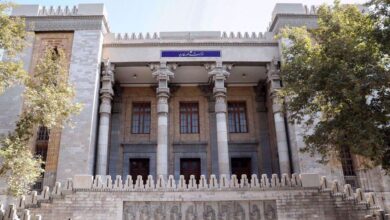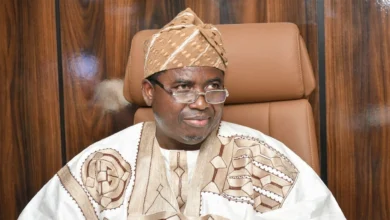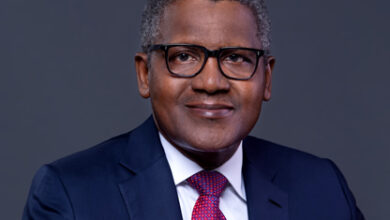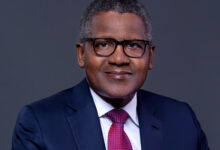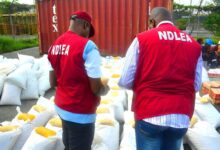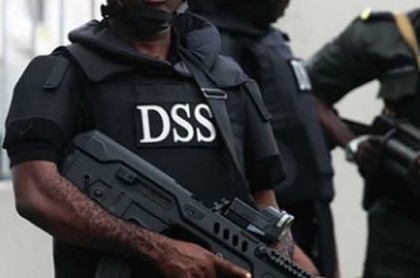NIGERIAN TRIBUNE: Salute to the elephant at 74

By FESTUS ADEBAYO
(Published by the Sunday Tribune, November 12, 2023)
When a child pours libation and gives iba (respect) to the shade of the farm, our elders say he will till the land till evening in comfort. I owe the inspiration to write this piece to one of the few surviving icons of the Nigerian newspaper press, hugely venerated Lade Bonuola, a.k.a Ladbone, ex-Managing Director of The Guardian. He is one of the ancestors who trod this path of column-writing long before those of us, today’s masquerades, knew the way to Igbo Igbale, the sacred grove. Seventy-something-year-old Bonuola’s piece, published by The Guardian on November 10, 2023 and entitled Truth and its Majesty not only served as a balm on an aching soul, it provoked the need to pay tribute to the Nigerian Tribune, Nigeria’s oldest surviving newspaper. The Tribune will celebrate the 74th anniversary of its founding in four days time, November 16. The paper first hit the newsstand on that day in 1949.
A tribute becomes necessary, as we say in journalism, so that we can do a tieback to the newspaper’s avant-garde and gadfly pedigree in pre and post-colonial Nigeria. That pedigree is what many are naïve about or have chosen to gloss over due to the atmosphere of complacency that pervades Nigeria today. A tribute is also curative to the scorched souls of those of us who have kept aloft the tradition of the Tribune in holding leaders to account. Perhaps, it can heal us of the unwarranted verbal assaults, derogatory name-calling and deliberate rings ran round us by commissars of the present federal government, which we have endured. These are all in the bid to ostracize us as bastards and our Yorubaness impugned.
The tribute is excerpted from my doctoral thesis entitled ‘The Nigerian Tribune and hegemonic politics in Nigeria, 1949 – 1993, supervised by one of Nigeria’s very best political scientists, Professor Adigun Agbaje. That thesis which I submitted to the Department of Political Science, University of Ibadan in 2010 – thirteen years ago, will soon be a book with its own light shed on the role of the press in Nigerian politics.
On the 70th anniversary of the Tribune, I had the honour of presenting same tribute in a paper I delivered to an august gathering that had the late Alaafin of Oyo, Oba Lamidi Adeyemi as well as Gen Theophilus Danjuma, Pa Ayo Adebanjo, ex-Gov Gbenga Daniel and many more in attendance. I entitled the paper Tribune at 70: Journey through barbwires, arson and anger of the State.
In his piece, Bonuola reminded the world of the ideals behind Chief Obafemi Awolowo’s establishment of the Tribune and the eternal essence of its 74-year old editorial policy. It is necessary to remind us that the freedom of Nigeria and the democracy Nigerians enjoy today were, in part, a product of the decision by Awolowo to found the newspaper.
Nigeria of the 1940s witnessed a drift toward subgroup nationalism and tribalism, provoked and exacerbated by Nnamdi Azikiwe’s dominance of newspaper press ownership. This was the impetus that fired some Yoruba and Hausa elites’ desire to have a rival hold that would define their own socio-politics. Founding a newspaper was one of them. Azikiwe and his associates were resented because their politics and influence in the media threatened the socio-political positions of Yoruba leaders and challenged their individual aspirations for leadership.
With his West African Pilot newspaper founded in 1937, Azikiwe attacked the Egbe of Oduduwa, a socio-political group founded by Awolowo and his Yoruba-conscious group elites, frequently lampooning topmost Yoruba and their chiefs, as well as some emirs of the north. Quite predominant in the growing disenchantment with Azikiwe was the widespread bitterness with his “over-protection” of his tribal bloc, while seeking to whittle others down. For instance, Dr. Okechukwu Ikejiana, one of the first Nigerians to be appointed at the University College Ibadan, (UCH) had claimed to have a DSc. from Toronto, Canada. Ikejiani was a favourite of Dr. Mellanby who was the first Principal of the College. It was later found out that Ikejiani’s DSc. degree was contrived. Thus, Dr. Mellanby, though fond of Ikejiani, had no choice but to dismiss him from the University College. Miffed by this action against his godson, favourite kinsman and party man in the NCNC, Zik had to mount virulent attacks on the University College, as well as Dr. Mellanby, in the Pilot. As a way of spiting the university, Zik got Ikejiani appointed as member of the Governing Council of the university between 1961 and 1965 as Chairman of the Governing Council of the university where he had earlier been dismissed. He later appointed him Chairman of the Nigerian Railway Corporation.
Azikiwe’s NCNC and his Igbo stock became identified with the Pilot group of newspapers, Ahmadu Bello’s NPC with the Nigerian Citizen and later on, the New Nigerian which he founded shortly before he was killed in the 1966 coup. Awolowo became signposted by, and even identifiable with the Nigerian Tribune. Seeing the need to situate the place of the Yoruba in national politics and to counter Azikiwe’s unfairly domineering influence in the Nigerian press of the time, the idea of founding a newspaper to project the voice of the Yoruba in the national scheme of things was conceived. The Nigerian Tribune newspaper was agreed to be its name. And on November 16, 1949, the baby, conceived with fecund thought for the place of the Yoruba nation and ultimately, the Nigerian Project, was born.
Aside his foray into politics, the founder of the Tribune, Chief Obafemi Awolowo, had once been a practicing journalist, having been employed in 1934 as a reporter-in-training by the Nigerian Daily Times and having worked for a cumulative eight months in the establishment. Though he never wanted to be a journalist, due partly to the unenviable public image of the profession at the time, especially the perception of its practitioners as scum of society, as well as the deprivation imprimatur that its leading editors and practitioners in general presented, Awolowo, however, found journalism as a pedestal to earning some money to enable him achieve his life-long ambition of studying law abroad.
On November 16, 1949, however, the Nigerian Tribune appeared on the newsstand. An eight-page tabloid, it came smoking-hot from the beginning, from both ends of its canons. For example, its first edition carried a lead story entitled, Chemists protest. It identified with the protest of the Association of Pharmaceutical Students of Nigeria against the Pharmaceutical School, Yaba, Lagos. The students were protesting the payment of the sum of £5. 5s per month subsistence allowance to them and demanding its increase to £7 per month. The fact that the newspaper chose as its lead story this particular story, as against another story on the front page of the paper, entitled, Mystery tree near Oyo, was unusual.
The Enugu Colliery incident of December 1949, in which the police shot and killed some coalminers, gave the newspaper its desired nationalistic underpinning and recognition as a fighter for the oppressed, no matter where the oppressed was domiciled. The miners were said to have protested against the oppressive conduct of their bosses, low wages and poor conditions of service. The brutal quelling of the demonstration by the police led to the death of about 21 miners which provoked very fierce editorial and features from the Tribune.
Because of this publication, which fell into about five weeks of the beginning of its operations, the editor of the Tribune was summoned by the colonial authorities before the Fitzgerald Commission probing the Enugu coal mine killings for what was considered a seditious publication. Thereafter, however, due to the Tribune publications and the concerned voices of the people, the Western part of the country was co-opted into the drastic steps taken to get to the roots of the crisis and give succour to the families of the victims. According to Arifalo, a coalition was organized by Nigerian political leaders as a response to the police shooting which had Dr. Akinola Maja as Chairman and Mbonu Ojike, the Deputy Chairman.
Even though there was no formal Mission Statement on the direction that the Tribune newspaper would follow at its inception, what could be held as the geography of its advocacy was, one, a piece written by the founder of the newspaper in the maiden edition of the publication and the second, a proper editorial policy of the newspaper articulated by Alhaji Lateef Jakande, the newspaper’s managing director and editor-in-chief (Editorial comment, May 23, 1977 with the title, A leap forward.). This was reproduced by the newspaper on March 4, 1984 under the title, Why we are that way.
Prefaced by a recalcitrant poetry from one C. E. Henley which says “my head is bloody but unbowed,” among other things, Jakande espoused the J. S. Mill utilitarian ideology of the greatest good as the force that fires the newspaper’s zeal and stating that Tribune “owes a tremendous responsibility to the public it serves.” The editorial policy, said Jakande, focuses on, “the expression of public opinion”, rather than the service of any hegemonic quest.
Having performed this role creditably well, however, the years between 1962 and 1966 could unarguably be said to be the most politically tumultuous for the Tribune, as well as the Western region. Nigeria eventually partook of the turmoil, with the overthrow of the First Republic by the military. Even though not as tumultuous as the former, the period of the Second Republic, that is 1979 to 1983, was also as turbulent for the newspaper which witnessed constant struggle to subvert and delegitimize arrayed forces against the interest of the Yoruba people and that of the Awolowo political group.
In the fight between the Premier, Samuel Ladoke Akintola’s political group and Awolowo’s, the government of Akintola nearly grounded the Tribune. Beginning from 1963, the newspaper faced an endless regime of violence visited on it at the whim of the runners of government, as well as persecution, discrimination, intimidation, and many litigations designed to cripple it economically and wind up its overall operations. During the period of the Emergency Rule, the Majekodunmi administration brought several sedition charges against both the Tribune and other newspapers allied to it, especially those in its chain of merger called Amalgamated Press Ltd., like the Daily Service and the Daily Express.
The Daily Express editor, Timothy Olu Adebanjo, courted the ire of Majekodunmi. He was arrested and charged to court. At the trial, in which the Amalgamated Press was defended by the duo of one Mr. Odedina and Chief Awolowo’s son, Segun (who was shortly killed in a car crash), the judge found the newspaper chain guilty for going beyond ‘the bounds of fair, decent and honest criticism’ and held that it had the intention of ‘ridiculing and lowering the prestige’ of the Administrator. It fined it £300.
The Akintola government and the Michael Okpara government in the Eastern Region, in alliance with the Action Group that formed UPGA, both engaged in retaliatory media salvoes against adversarial press reporting of their governments. While the Eastern Region, through its Local Government Councils, in 1965, imposed ban on the Daily Times, Morning Post, Daily Sketch etc for certain publications felt to be inimical to the running of its government, the Western Region, in a retaliatory move, also banned the circulation of the Pilot, Outlook and the Tribune from the Western region.
Prior to this, from March 16 to May 19, 1963, the Tribune newspaper was completely off the newsstands as the Akintola government-owned National Bank had instituted a court action against the newspaper, as well as Service Magazine, Iroyin Yoruba, and COR, which were all under the management of the Allied Newspapers Limited. At the commencement of the legal action, the Tribune management tried to wean itself of liability for the debt, citing its being a different legal entity from the Allied Newspapers. It sought to be treated as such in the liquidation of the debt. The court, however, saw things differently as it ordered that the premises and properties of the newspaper be ‘attached’ for a total recovery of the debt owed the bank. At the end of the ‘attachment,’ which resulted in total paralysis of the operations of the newspaper, eight of its printing machines were carted away and were subsequently auctioned at give-away prices to the rival Sketch newspaper established by Akintola as a counter-poise to the Tribune. The newspaper was to make a come-back to the newsstand on May 20, 1965 and it did with a recalcitrant, unbendable editorial on the same day.
As the newspaper sought to deflate the Akintola government by subjecting its policies to scrutiny, the Akintola government too in turn sought to emasculate the newspaper and this it did in several forms, one of which was harassment of its personnel, especially the ones behind what it felt was the irritancy of the newspaper. On February 5, 1964, a Tribune reporter, Mr. Adetunji Adeoye, was arrested by the police and was immediately charged for wandering at the Premier’s Lodge at Iyaganku, Ibadan. He had in fact gone to the Lodge to cover the special meeting of the Egbe Omo Olofin, the cultural counter-poise to the Egbe Omo Oduduwa, formed by Akintola to finally sound the knell on the Awolowo political brand. The Tribune had visited very scathing diatribes on the founding of the rival organization and it was thus predictable that the Premier would view any impending report on the budding organization by the Tribune as an adversarial report. The charge could however not stand as the police eventually withdrew it from the court.
Also on April 16, 1964, the newspaper’s editorial courted the ire of the Premier who ordered the police to swoop on the premises of the newspaper. In the editorial, the newspaper had quoted a Minister who said that the Akintola NNDP-led government had upped awareness among the Yoruba people. In its interpretation of this, the editorial reasoned that the Akintola government was trying to incite the Yoruba against other ethnic groups. The Tribune was raided and at the end, several documents were carted away by the police, including a copy of the newspaper’s editorial comment for the second day, April 17, 1964. This later became the subject of a one-count sedition charge slammed on the newspaper by the government.
The Akintola government was still not done with visiting its wrath on the newspaper. For publishing a story entitled COP sacked for querying NNDPer in its August 31, 1964 edition, the government ordered that a team of men from the Nigeria Police raid the newspaper. They arrived on September 2, 1964. They were ostensibly searching for the manuscript of the said story. At the end of the raid, the police took along with them the newspaper’s acting editor, Mr. Ayo Ojewumi and a reporter, Mr. Bola Aragbaye, who were grilled and eventually, they, alongside the Tribune, were charged to court for false publication.
On January 4, 1965, for writing an editorial which was a critique of the 1964 Federal Elections, where the Tribune took the government of Tafawa Balewa to the cleaners for what it perceived were shoddy elections targeted at promoting the NPC and its NNDP ally into office, police again, for over an hour, swooped on the premises of the newspaper at Adeoyo, Ibadan, ferreting for documents. At the end of the day, the newspaper’s acting editor, Mr. Folarin Adeeko, was arrested and quizzed by the police and was later released on bail.
Again, on April 21, 1965, a team of policemen arrived the premises of the Tribune alleging that it was looking for the News Room’s Assignment Book and Desk Diary, an itinerary of reporters on duty and their operations. The team could however not retrieve anything from the premises. On June 5, a sedition charge was slammed on the newspaper for a leader in the April 16 edition entitled, Where do we go from here? The notice of the sedition charge was published on the front page of the paper of June 6, 1964.Also, for writing a story the previous day on its front page on a supposed arms cache linked to the NNDP, a detachment of police men, on June 27, 1965, stormed the Tribune. They searched the offices of the newspaper, as well as the home of its editor, Mr. Ojewumi, for the manuscript of the story, in vain.
Six days after, precisely on July 3, 1965, Ojewumi was again questioned by the police in connection with a story in the newspaper to the effect that the Western Regional Minister of Information had boasted that 60 prospective NNDP men would be returned unopposed at the rescheduled Regional Elections. Again, on August 25, 1965, the newspaper’s offices were thoroughly ransacked and its editor interrogated over a story in its August 17 edition. The government didn’t end at this. It, on the basis of this story, instituted a sedition suit against the newspaper.
On October 6, the police again swooped on the premises of the newspaper at Adeoyo, alleging that it had come to investigate an anti-NNDP story it had written in the edition of the day. When it could not lay its hands on the manuscript, the police went with two members of staff of the newspaper, to wit the editor, Mr. Ojewumi and Mr. Kanye Eleko. The story of this swoop was published on the front page of the newspaper’s October 7 edition. The paper alleged that the raid was dictated by a story it carried on September 7, 1965 entitled Ogundina asked to stop threat and thus, the “the CID men dashed to the Red Lion House of the editor, Mr. Ayo Ojewumi,” only for them to reappear at about 4pm of the same day looking for the manuscript of the previous day’s editorial comment.
Again, on October 13, 1965, at two hourly intervals, the police raided the premises of the Tribune four times. Two days before, the re-arranged Regional Elections had taken place and the two alliances, viz NNA and UPGA, had declared themselves winner. Expectedly, the Tribune had trumpeted the win of UPGA and Adegbenro, urging the Acting Leader of the Action Group – Adegbenro – to form his cabinet immediately. It backed this seditious call with features and editorial comments.
Miffed by this, the police carted away heaps of the day’s edition of the newspaper and manuscripts of the stories that proclaimed Adegbenro’s victory. This raid was followed by a threat from the NNDP Secretary, Richard Akinjide, to thenceforth clampdown on “irresponsible journalism and publication of false news.”A detached team of Nigerian and local government policemen, on November 14, again swooped on the Tribune. Numbering about 150, they were at the newspaper’s premises before sunrise, ostensibly searching for thugs and arms allegedly kept in the premises. Some arrests were made, including four night guards that the newspaper hired to keep watch over the premises after the NNDP thugs’ arson of November 7 and they were subsequently charged for wandering and remanded in detention.
Mr. Ojewumi, who was to face stiffer wrath of government later, was on December 1, 1965 accosted by the police who said they had information that he was in possession of Indian hemp. A team of men of the police, led by Chief Superintendent Kofo Lasekan, had swooped on the Tribune and accosted Ojewumi that the team was looking for “Indian hemp in your possession.” The story was written in the newspaper of December 2, 1965, with Ojewumi warning, in the Editor’s note corner, all “UPGA leaders and supporters (against) receiving any stranger they do not know very well.” He had earlier been assaulted by men who were said to be NNDP thugs and his car damaged in his Ilobu, now Osun State, country home. He was subsequently detained for assaulting another person.
Then, from January 6 1966, the Tribune was off the newsstand. Giving reasons for this, the newspaper said it was not published “because the Nigeria Police, in a surprise swoop on the premises of the African Press, succeeded in paralyzing the production of the paper.” It was apparent that the newspaper’s editorial comment of the previous day, denouncing the Premier as a ‘shameless liar’ and in another segment of the edition, speculating that the Deputy Premier, Fani-Kayode might have been mortally wounded in a political fracas in his hometown of Ile-Ife, had led to the raid. The police, led by the Chief Superintendent for Ibadan Division, Mr. Kofo Lasekan, eventually carted 21 persons into detention, including visitors to the premises of the newspaper.
However, one long-drawn strain and intimidation on the newspaper was the trial and imprisonment of its editor, Mr. Ayo Ojewumi. The newspaper, on its own, most times in conjunction with Ojewumi, was slammed sedition charges and on some occasions, ordered to pay fines. Some of the charges had not been resolved as at the time of the collapse of the republic.
The sedition charge against Ojewumi was however concluded. Charged for seditious publication of the leader entitled Where do we go from here? (April 16, 1964), the editor was immediately detained by the police. The editorial comment, quite frankly, contained one of the newspaper’s most mordant strictures ever. It called government actions “awful, stinking, disgraceful and ugly,” and accused it of “reckless squandermania and abuse of office,” alleging in the same mould that ministers in the Akintola government, including the Minister of Agriculture, were deploying government farm equipment “to plough their fields.” Also on the editorial’s allegations was that that ministers, numbering over 50, collected £1000 and £3000 respectively in bonuses during the Republic and Christmas day celebrations. It also accused the Premier of hiring an Apala musician for personal fancy, at the public expense, for £20 a day, during the census celebration.
The crisis was so bad that on November 5, 1963, a woman, Mrs. Sikuola Odunaro, shouted the name of Awolowo while the Premier was passing by. Premier Akintola ordered her bundled into a police van. This it became the second lead story of the Tribune and entitled Woman arrested for ‘Awo’ cry.
As it were, on the morning of January 15, 1966, the military took over government via a bloody putsch, after an initial failed bid by Major Kaduna Nzeogwu and other Majors to oust the Federal Government. That was after Akintola, Balewa, Sardauna and other government officials had been killed. Doing an epilogue of the Akintola government and the fate of the Tribune in its hands, Ojewumi had written an opinion article entitled, The collapse of the First Republic.
During the civilian government of President Shehu Shagari, the Tribune equally faced persecution in the hands of the National Party of Nigeria (NPN) and its elements. Having now been in the hands of the UPN, the Daily Sketch also joined the positive press received by the UPN and negative reports by the NPN. For all these, however, the Sketch became a recipient of federal repression. Its Managing Director, Mr. Segun Osoba, was on September 1, 1981 charged before a Yaba Chief Magistrate’s Court for authorizing the publication of “a false news item.” The news item in question was a story in the newspaper of May 5, 1981. The prosecutor claimed that the story was capable of causing fear and alarm to the public. Its editor, Sola Oyegbemi, also went to court over the same story. The paper had reported that a police source confirmed to it that a robbery had taken place in broad daylight in Lagos. Mr. Oyegbemi was promptly arrested by the police and charged to court for conspiracy to commit felony in the publication of the “false news.” Mr. Oyegbemi prayed the court to restrain the police to desist from compelling him to disclose the source of his information. The court granted Odugbemi’s prayers and ruled that the disclosure would be an infringement on the fundamental human rights of the journalist.
During the military era that began from 1983 and ended in 1999, the newspaper received ambivalent responses to its publications by the military governments. While the Ibrahim Babangida government was cautious of public backlash for rising against the “newspaper of Awolowo,” the Sani Abacha government, though didn’t attack the organization as a corporate entity, showed its displeasure with its adversarial attacks on it by singling individual journalists out for sanction. On May 1, 1998, seven persons were killed in a May Day riots in Ibadan. In the melee, Editor of the Sunday Tribune, Femi Adeoti, Bola Ige and Lam Adesina were hauled into detention as a result of the chaos. They were detained on the order of the Abacha government whose military governor, Ahmed Usman, called “Prisoners of War.”
Since 1999 when the civilian government came into being, the Tribune has continued its avant-garde role of communicating the reality of society, jabbing governments in power when necessary and essentially acting out the role of public ombudsman. That role has not changed and is not going to change as the newspaper prepares its journey towards its centenary celebrations which is just 26 years away. Ladbone (Lade Bonuola) held in his seminal article earlier referenced that “it is too late to get the Tribune to bend to anybody’s inclination, tendencies or beliefs or gag her editors.” While Tribune continues on that road of “honourable intransigence”, to its apamaku (undying) spirit – this became its moniker, christened it by Yoruba who witnessed its undaunting survival in the face of governmental cruelty – I pour libation of victory while I wish it a happy 74th birthday in advance.



